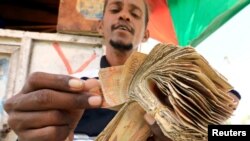The World Bank on Thursday said it is normalizing relations with the Federal Government of Somalia after 30 years.
The bank noted the Somali government’s “strong record of fiscal, political, social and economic reforms in recent years” in making the move.
“Normalizing relations means that the country is now in good standing with the World Bank,” World Bank Country Manager Hugh Riddell told VOA Somali. “It means that going forward Somalia will be able to access grants, grants financing for poverty reduction.”
He said the new grants will help Somalia invest in basic needs of the Somali people.
News of the World Bank’s move came just a day after the International Monetary Fund announced it had secured “sufficient financing pledges” to provide comprehensive debt relief to Somalia. More than 100 IMF member countries have pledged to provide US$334 million in financing, IMF said.
The African Development Bank and African Development Fund approved a framework for $122.55 million to clear Somalia’s arrears on the same day as the IMF announcement.
Somalia owes more than $5 billion to external creditors and hopes to achieve debt relief under the Heavily Indebted Poor Countries (HIPC) initiative.
Riddell said the nod from the World Bank does not mean that Somalia will borrow more money. This was in response to concern from Somali observers that the improvement in financial standing by the Somali government could translate into borrowing and taking on more debt.
“This does not mean that Somalia will have access to lending, there will be no loans from the World Bank; the financing that will come will be purely grants,” Riddell said.
“Somalis need not worry that this will lead to borrowing by the Somali government, and the World Bank money will be purely 100 percent grants,” he added.
Riddell says the bank has been working closely with the Somali Ministry of Finance and the central bank since 2012. He praised the reforms made.
“Some of the basic reforms that have taken place over the past seven years have been increasing revenue generation, not only Mogadishu port, Mogadishu airport but also increasingly the private sector,” he said. “That means that the government is able to generate its revenues from businesses, and those businesses are happy to pay increasing amounts of tax to the government because of the transparency that is now in the budget system and the oversight of the expenditures that is now carried out by the Ministry of Finance.”
He also said that Somalia’s Auditor General has been carrying out annual audits of the budget and is reporting to the parliament. He said laws have been passed that enabled the central bank of Somalia to carry out supervisory functions in the financial sector of remittances, as well supervise the new Somali banks that have been formed.
The Somali prime minister has welcomed the move by the World Bank and the African Development Bank, and described it as a “landmark milestone.”
Prime Minister Hassan Ali Khaire tweeted: “#WB & #AfDB announce to reengage #Somalia, clear arrears & ultimately relieve the country of the debt burden under the HIPC Initiative, paving the way 4 tremendous foreign direct investment! Our commitment to reform begins to pay dividends. Deeply indebted!”






